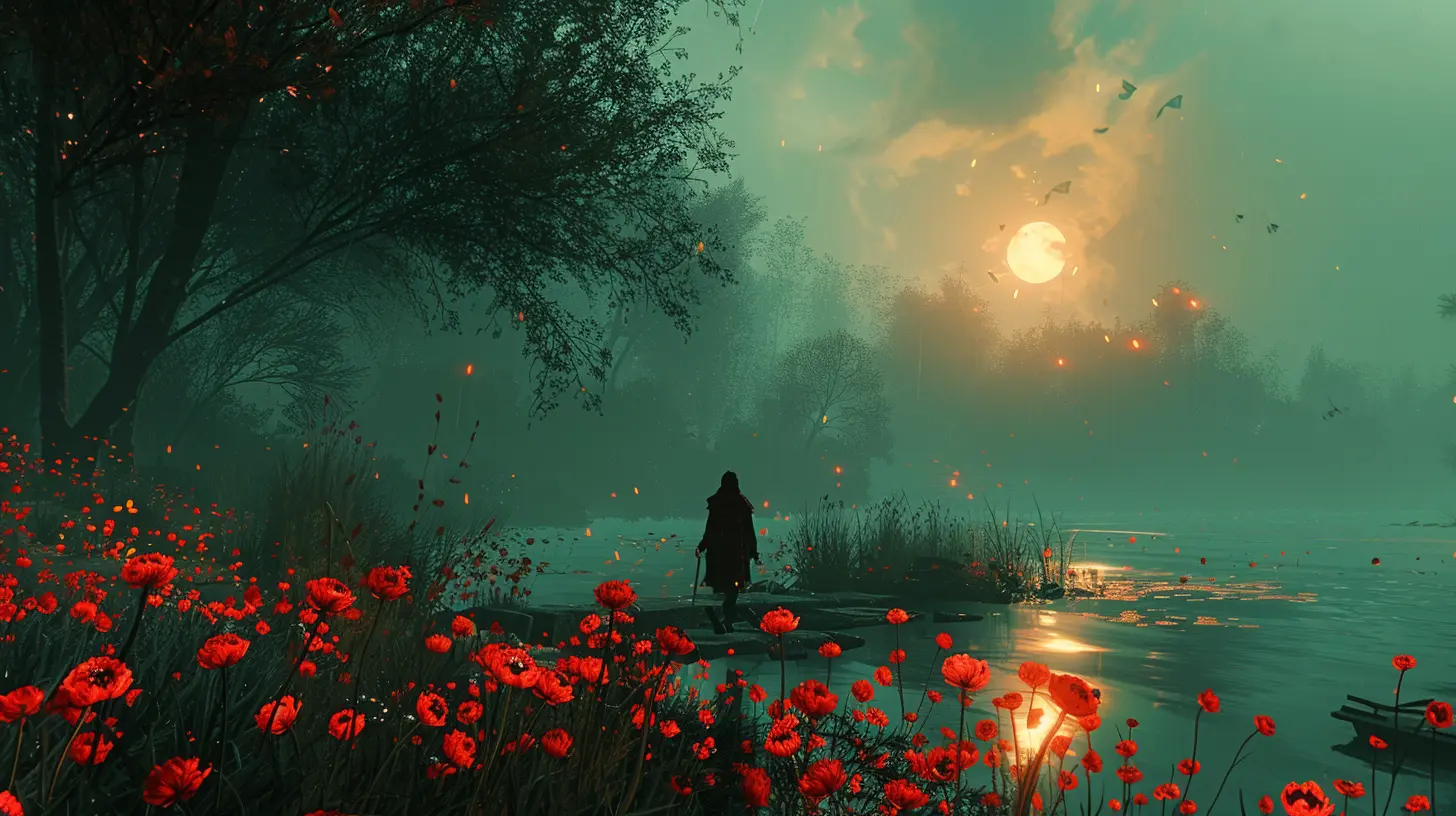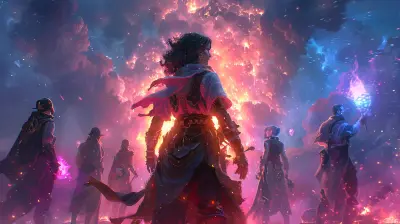The Role of Consequences in Shaping a Player-Driven Narrative
2 May 2025
Have you ever played a game where every single one of your decisions mattered? One misstep, one wrong dialogue choice, and suddenly the entire storyline spirals in a completely unexpected direction. It’s thrilling, isn’t it? That feeling of being responsible for your own fate, your own story—like being the protagonist of your very own “choose your adventure” book. That’s the beauty of player-driven narratives. But what truly makes them shine? Consequences. Let’s dive into the guts of this concept and explore how in-game consequences shape player-driven storytelling.
What Exactly Is a Player-Driven Narrative?
Before we get into the nitty-gritty of consequences, let’s establish what a player-driven narrative even is. In essence, it’s when a game hands you the reins and says, “Here, take the wheel.” The story doesn’t just unfold around you; you’re an active participant. Unlike linear games where you passively watch events unfold, here you actually influence the storyline through your actions, choices, and decisions. Think of games like The Witcher 3, Detroit: Become Human, or Mass Effect. These games thrive on putting you in situations where your choices genuinely matter.But here’s the catch: without meaningful consequences, player-driven narratives lose their impact. It would be like watching a movie where the hero keeps making decisions, but the plot remains the same. Boring, right? Consequences are what elevate this genre, creating a dynamic, immersive experience where every action counts.
Why Aren’t Consequences Just “Optional Extras”?
You might be wondering, “Why all this fuss about consequences? Can’t games just be fun?” Sure, they can! But here’s the thing: consequences are the secret sauce that makes player-driven games unforgettable. Imagine playing a game where no matter how reckless or careful you are, everything lands the same way. Where’s the tension? Where’s the investment?Consequences give weight to your actions. They teach you that your choices have meaning—whether that means sparking remorse, joy, pride, or regret. They’re like that friend who calls you out when you mess up but still pushes you to grow. In gaming terms, they create emotional stakes. Without them, even the most beautifully constructed worlds or heart-pounding narratives can feel...hollow.
The Butterfly Effect: Small Actions, Huge Ripples
In many player-driven narratives, consequences often work on a system we know as "the butterfly effect." You know, where one small flap of a butterfly’s wings could cause a tornado halfway across the world? Okay, maybe not that extreme—but you get the point.Take Life is Strange, for example. In this game, even small decisions like watering a plant or answering a friend’s phone call can have profound repercussions later. Something as mundane as choosing the right words in a conversation could lead to shocking twists down the line. It’s this unpredictability that keeps players hooked. You’re constantly second-guessing yourself, wondering, “Did I just make the right call?”
And here’s the fun part: these consequences don’t always hit you right away. Sometimes, they sneak up on you when you least expect it. You might think you dodged a bullet, only for your past actions to come back and smack you in the face hours later.
Immediate vs. Long-Term Consequences
Not all consequences are created equal. Some are immediate, like stealing from a shopkeeper in Skyrim and immediately having guards chasing after you. Others brew beneath the surface, slowly building until they erupt into something massive. Both types serve unique purposes in player-driven narratives, and when balanced well, they create an unforgettable experience.1. Immediate Consequences
These are the “instant karma” moments. They’re great for keeping players on their toes and reinforcing that actions have repercussions. Accidentally shoot a companion in Red Dead Redemption 2? Expect your relationship with them to sour—or worse, your whole mission to fail. It’s like sticking your hand in a beehive. The result is instant (and stings like hell).
2. Long-Term Consequences
These are usually the more impactful of the two. They simmer in the background, allowing tension to build until they explode into something game-changing. Think of a character who remembers how you treated them earlier in the game. Were you kind, or did you trash-talk them? Those interactions could determine whether they save you or betray you when it matters most. It’s the gaming equivalent of sowing seeds—you reap what you sow, but only after some time.
The Emotional Punch: Why We Care About Consequences
Let’s get real for a second—why do gamers even care about consequences in the first place? Isn’t it just a game? Sure, but great games make us feel. They tug at our emotions, making every victory sweeter and every regret sharper.Consequences hit us on a personal level. They force us to live with decisions we’ve made—good, bad, or somewhere in between. Did your favorite NPC die because of a choice you made? That pain sticks with you. You might even carry that guilt through multiple playthroughs, replaying sections just to make things right. And when you do succeed? Oh man, it feels like redemption.
Consequences also add replayability. You’re more likely to dive back into a game when you know there’s a chance to see how things could’ve turned out differently. Want a good ending? Play as the saint. Feeling chaotic? Go full villain. The point is, the game molds itself around you, and that’s what keeps it fresh.
Challenges Developers Face When Crafting Consequences
Of course, crafting a web of meaningful consequences isn’t easy. It’s like trying to play chess on multiple boards at once. Developers have to anticipate countless choices, outcomes, and player behaviors to make everything feel cohesive. And let’s not forget the budgetary and time constraints of game development.One big hurdle is making sure all outcomes feel equally valid. No one wants to feel like their choices led to a “lesser” version of the story. The challenge lies in ensuring that all branching narratives feel rewarding, even if they’re wildly different.
There’s also the risk of overwhelming players. If every decision feels like it carries earth-shattering consequences, it can lead to decision paralysis. Nobody wants to spend 30 minutes agonizing over whether to pick Option A or Option B in a dialogue tree. Balance is key here.
Player-Driven Narrative: A Fine Balance of Freedom and Boundaries
While player-driven narratives emphasize freedom of choice, they’re not just about letting players go wild. Effective storytelling still requires structure. Think of it as a highway—you can switch lanes, speed up, or slow down, but there are guardrails to keep you from driving off a cliff.This balance between freedom and boundaries helps developers tell a compelling story while giving players the agency to leave their mark. Games like The Witcher 3 are a masterclass in this. Your choices shape the world around you, but there’s still an overarching narrative to guide you through the chaos.
Why Consequences Are the Future of Gaming Narratives
As gaming continues to push the boundaries of storytelling, consequences are becoming more essential than ever. Players are no longer satisfied with static, predictable narratives. We want to feel like the co-authors of our own stories, like our presence in the game world matters.With advancements in AI and game design, we can expect even more intricate webs of consequences in the future. Imagine NPCs who remember every little thing you’ve ever done—or worlds where even the tiniest actions create ripples. The potential is mind-blowing, and honestly, we’re just scratching the surface.
Final Thoughts: Choices Matter
At the end of the day, the role of consequences in shaping a player-driven narrative isn’t just about making a game more entertaining—it’s about making it meaningful. It’s what keeps us talking about our favorite games years after finishing them. It’s the reason some choices feel like they weigh more than a boss fight, and why we scream at our screens when a beloved character dies because of something we did.So the next time you’re knee-deep in a player-driven game, take a moment to appreciate just how much work went into crafting those consequences. Every choice, every ripple—it’s all designed to make you feel like the captain of your own ship. And isn’t that what gaming’s all about?
all images in this post were generated using AI tools
Category:
Interactive StorytellingAuthor:

Kaitlyn Pace
Discussion
rate this article
4 comments
Karson Hahn
Consequences: the spicy pickles of gaming narratives—crunchy, unexpected, and sometimes a little sour!
May 15, 2025 at 3:59 PM

Kaitlyn Pace
Thanks for your clever analogy! Consequences add depth and unpredictability to player-driven narratives, much like those spicy pickles—exhilarating yet unpredictable!
Thalwen Blevins
Consequences enrich narratives, empowering players' unique storytelling experiences.
May 14, 2025 at 3:09 AM

Kaitlyn Pace
Thank you! I agree—consequences truly enhance storytelling by allowing players to shape their own unique experiences.
Lola Ellison
Consequences enhance immersion, making player choices more impactful and meaningful.
May 7, 2025 at 3:01 AM

Kaitlyn Pace
Thank you for your comment! I completely agree—consequences are crucial for deepening player engagement and ensuring that every decision feels significant within the narrative.
Miriam Baxter
Consequences elevate player agency, transforming choices into meaningful narrative experiences. Essential for immersion.
May 4, 2025 at 4:49 AM

Kaitlyn Pace
Thank you for your insight! I completely agree—consequences truly enhance player agency and deepen the narrative experience, making choices feel impactful and immersive.



